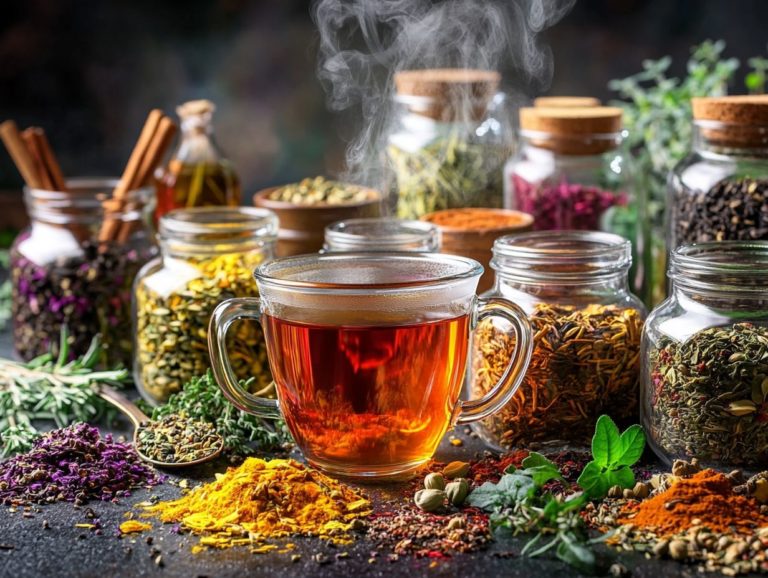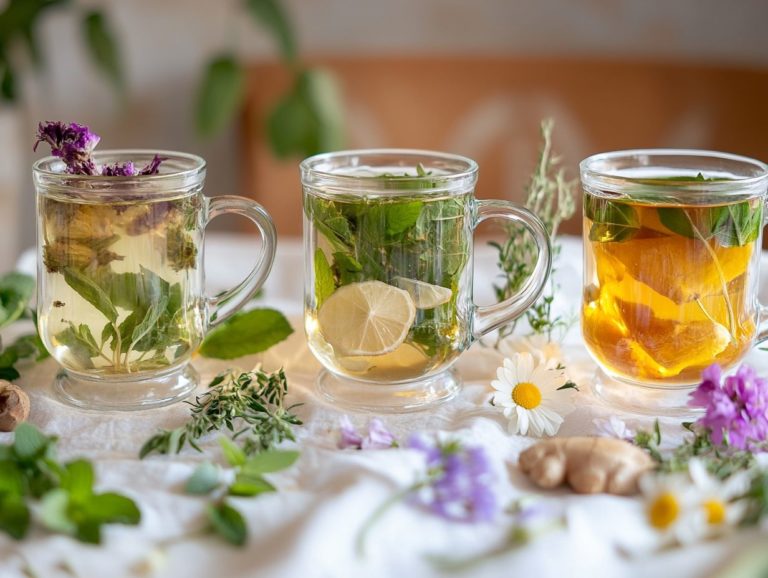Caffeine-Free Herbal Teas for Sensitive Tummies
If you have a sensitive stomach, finding the right beverage can be a challenge.
Caffeine-free herbal teas offer a soothing option that comforts and promotes digestive health. Explore a selection of 15 herbal teas like chamomile, peppermint, and ginger to help alleviate tummy troubles.
Dive into their benefits and potential side effects. Discover tips to seamlessly incorporate them into your daily routine and uncover natural remedies that could be your new go-to for a happier gut!
Contents
- Key Takeaways:
- 1. Chamomile
- 2. Peppermint
- 3. Ginger
- 4. Licorice Root
- 5. Fennel
- 6. Lemon Balm
- 7. Dandelion Root
- 8. Rooibos
- 9. Hibiscus
- 10. Passionflower
- 11. Echinacea
- 12. Lavender
- 13. Lemon Verbena
- 14. Rosehip
- 15. Nettle Leaf
- What Are the Benefits of Caffeine-Free Herbal Teas for Sensitive Tummies?
- Frequently Asked Questions
- What are the benefits of drinking caffeine-free herbal teas for sensitive tummies?
- Can caffeine-free herbal teas still provide energy without the caffeine?
- Are there any potential side effects of drinking caffeine-free herbal teas?
- Are there any particular herbs or ingredients to look for in caffeine-free herbal teas for sensitive tummies?
- Can caffeine-free herbal teas help with weight loss?
- Can children or pregnant women drink caffeine-free herbal teas for sensitive tummies?
Key Takeaways:

- Chamomile, ginger, and peppermint are effective caffeine-free herbal teas for sensitive tummies. They are known for their soothing and anti-inflammatory properties.
- These teas can alleviate digestive issues like bloating, stomach pain, and nausea, making them a safe option for sensitive stomachs.
- Use caution and moderation with herbal teas; some may interact with medications. Always consult a healthcare professional before trying new remedies.
1. Chamomile
Chamomile tea is celebrated for its calming effects and is a natural remedy for digestive issues, including nausea and stomach pain. It s rich in antioxidants, which enhance digestive health.
To benefit from chamomile, brew it just right. Steep one to two teaspoons of dried chamomile flowers in hot water for five to ten minutes to allow the flavors to meld.
For a delightful experience, add honey or a slice of lemon. These not only enhance the sweet, apple-like flavor but also support digestion. Sipping it warm brings comfort and helps relax your gastrointestinal muscles.
2. Peppermint
Peppermint tea is an excellent choice for relief from digestive issues. Its refreshing properties ease symptoms of nausea and bloating.
This caffeine-free herbal tea provides a soothing sensation while also aiding digestion and alleviating stomach pain. With its invigorating aroma, peppermint tea supports your digestive health in a delicious way.
Integrating this herbal infusion into your routine is simple. Steep fresh or dried peppermint leaves in boiling water for 5 to 10 minutes, then add a slice of lemon or a dash of honey for sweetness.
Keeping a thermos of brewed peppermint tea handy encourages frequent sips, reinforcing its digestive benefits and keeping you hydrated.
3. Ginger
Ginger tea is celebrated for its remarkable ability to soothe an upset stomach and combat nausea. This makes it a favored natural remedy for digestive health. This potent herbal infusion harnesses the anti-inflammatory properties of ginger, providing relief from digestive issues like diarrhea and bloating. Ginger tea has a warm, spicy flavor that many find comforting and revitalizing. It s an ideal choice for those who prefer a caffeine-free beverage.
Don t miss out use fresh ginger root to unlock the full benefits of this aromatic brew. It delivers a more pronounced flavor and boasts higher nutrient content compared to dried alternatives. Slice a one-inch piece of fresh ginger and steep it in boiling water for about 10 to 15 minutes. This allows the ginger s essence to fully infuse the water. This optimal steeping time enhances the flavor and maximizes its anti-inflammatory effects. It’s an excellent choice for anyone aiming to support their digestive health.
For an even more delightful experience, adding a dash of honey or a squeeze of lemon can beautifully complement ginger’s natural properties.
4. Licorice Root
Next up is Licorice Root, a somewhat underrated herbal remedy. It can be your go-to for promoting digestive health and easing those pesky symptoms of stomach pain and bloating. Its natural sweetness makes it a delightful addition to your teas, while its therapeutic compounds work wonders in soothing irritation within your digestive tract.
By embracing licorice root as a natural remedy, you can help your digestion work better and find relief from various gastrointestinal issues, including an upset stomach and nausea.
This amazing herb not only calms your stomach but also protects it! It forms a protective barrier for your gastrointestinal lining, helping to prevent further irritation. It contains glycyrrhizin, a natural compound that helps reduce inflammation, making it a valuable ally for tackling indigestion and heartburn. Just remember, moderation is essential; overindulging can lead to side effects like elevated blood pressure or potassium imbalances.
If you’re looking to incorporate licorice root into your daily routine, consider crafting a soothing tea blend by mixing it with chamomile or peppermint. This not only enhances the flavor but also amplifies the digestive benefits.
5. Fennel
Fennel tea is a true gem when it comes to digestive health. It is renowned for its ability to alleviate bloating and soothe upset stomachs. This herbal infusion, derived from the aromatic fennel plant, offers a delightful sweet, licorice-like flavor while effectively calming gastrointestinal discomfort. Packed with antioxidants and essential oils, fennel tea not only aids digestion but also promotes overall intestinal well-being. It provides you with a refreshing caffeine-free option for relief.
To truly harness its benefits, proper brewing is essential. Begin by using one to two teaspoons of crushed fennel seeds for each cup of hot water. Allow it to steep for about 10 to 15 minutes. This steeping time extracts the beneficial compounds and enhances the flavor. Enjoy it warm, ideally between 130 F and 160 F. This temperature range unlocks the essential oils without compromising the taste.
Your digestive system will thank you for the warmth and comfort this soothing beverage provides, making it an ideal companion after meals.
6. Lemon Balm
Next, we have Lemon Balm, that aromatic herb renowned for its calming properties. It offers remarkable benefits for your digestive health. It s a perfect ally in alleviating nausea and discomfort. Imagine enjoying a delightful cup of herbal tea that not only refreshes but also soothes your digestive system. The gentle effects of lemon balm can relax your stomach muscles, making it an ideal choice for a caffeine-free beverage, especially if you experience digestive issues.
Its subtle lemony flavor blends seamlessly into various herbal tea concoctions, enhancing both taste and health benefits. To brew your perfect cup, simply steep fresh or dried lemon balm leaves in hot water for about 5 to 10 minutes. This allows those essential oils to work their magic.
For an extra zesty twist, try pairing lemon balm with ginger for a warming sensation or with chamomile to elevate your relaxation. Have you ever tried blending lemon balm with ginger for an extra kick? These combinations not only enhance the flavor but also amplify the soothing effects on your digestive system. This transforms each sip into a comforting experience.
Try these herbal teas today to support your digestive health and experience their soothing benefits!
7. Dandelion Root

Dandelion root is becoming popular for its potential to support digestive health and alleviate stomach pain. This herbal infusion serves as a natural remedy that stimulates digestion and promotes liver function.
Its earthy flavor makes dandelion root tea a delightful caffeine-free option. You can enjoy it warm or cold.
Don t miss out on incorporating dandelion root into your daily routine! It can help reduce bloating and enhance nutrient absorption.
To prepare this beneficial tea:
- Take dried dandelion root.
- Steep in boiling water for about 10 to 15 minutes.
- Add honey or lemon for extra flavor and health benefits.
Regular consumption can significantly contribute to your overall gastrointestinal wellness, making it a simple yet effective addition to a balanced diet.
8. Rooibos
Rooibos tea is a naturally caffeine-free herbal beverage with benefits for digestive health. Sourced from the South African rooibos plant, it acts as a soothing remedy for digestive discomfort.
With its rich antioxidants, rooibos not only improves digestion but also brings many health benefits, making it a stellar option for any tea connoisseur.
You ll appreciate its naturally sweet and slightly nutty flavor, which can be enjoyed solo or blended with other ingredients. For a refreshing twist, consider adding a splash of lemon or a hint of vanilla.
To craft the perfect cup:
- Steep rooibos in boiling water for about five to seven minutes.
- Enjoy it as a digestive aid or to unwind during a cozy evening.
9. Hibiscus
Hibiscus tea is a vibrant herbal infusion with a tart flavor and impressive health benefits. It serves as a natural remedy for stomach pain and bloating, making it an ideal choice for anyone dealing with digestive woes.
Packed with antioxidants, hibiscus not only aids digestion but also offers a refreshing caffeine-free option that can be savored either hot or iced.
This tea is believed to encourage regular bowel movements and may help alleviate symptoms of indigestion, positioning it as an excellent ally for maintaining overall gut health.
To brew hibiscus tea:
- Steep dried hibiscus flowers in boiling water for about 5-10 minutes.
- Adjust steeping time based on your preferred strength.
- For an enticing twist, pair it with citrus fruits like lemon or orange, or add a hint of mint.
- If you have a sweet tooth, incorporate sweeteners like honey or agave.
10. Passionflower
Passionflower is a calming herb to reach for when you need relaxation. It’s known for its soothing qualities, supporting digestive health and easing upset stomachs.
This gentle infusion acts as a natural remedy, promoting a sense of well-being while gently alleviating gastrointestinal issues.
With its mild flavor, passionflower tea is a versatile addition to your tea collection, especially if you re looking for caffeine-free choices.
To brew your ideal cup:
- Steep dried passionflower in boiling water for about 10-15 minutes.
- Sipping this soothing tea on a cozy afternoon can amplify its calming effects.
11. Echinacea
Echinacea is renowned for its immune-boosting properties and is your go-to natural remedy for digestive health. It soothes gastrointestinal discomfort, alleviating issues like bloating and nausea. Its earthy flavor adds a comforting touch, making it a delightful addition to your herbal tea collection.
Incorporating echinacea into your daily routine is refreshingly simple. You can brew dried echinacea roots or leaves in hot water for about ten minutes to create a calming tea.
You can also find echinacea in tincture or capsule forms, seamlessly fitting into a busy lifestyle. Adding a teaspoon of honey can enhance the flavor while providing extra soothing properties.
For those eager to elevate their wellness regimen, mix echinacea extract into smoothies or yogurt. This discreetly delivers its benefits, supporting both your immune and digestive health.
12. Lavender
Lavender is beloved for its calming effects and offers a wealth of benefits for your digestive health. It alleviates discomfort and encourages relaxation. This aromatic herbal tea serves as a natural remedy for digestive issues like nausea and bloating, providing a soothing experience that eases your troubles.
With its delightful floral flavor profile, lavender tea is a perfect caffeine-free indulgence. It may assist in digestion by relaxing the muscles of your digestive system, helping to reduce cramping and discomfort after meals.
To brew this herbal tea, steep the dried flowers in boiling water for about five minutes to unlock their full flavor and benefits. Consider pairing lavender with other calming herbs like chamomile or peppermint to enhance its digestive properties.
This harmonious blend promotes overall wellness, elevating not just the taste but also the soothing experience of each cup. It transforms your tea time into a ritual of relaxation ideal for winding down after a long day.
13. Lemon Verbena
Lemon verbena is a fragrant herb that captivates with its citrusy aroma. It’s highly regarded for its digestive health benefits, especially in alleviating nausea. This refreshing herbal tea serves as a delightful natural remedy, promoting relaxation while soothing your digestive tract.
Its unique flavor profile makes lemon verbena an invigorating choice for anyone seeking caffeine-free options that support gastrointestinal well-being. Incorporating lemon verbena into your daily tea blends can elevate both flavor and digestive comfort.
To brew the perfect cup, steep a teaspoon of dried lemon verbena leaves in hot water for about five to ten minutes. This allows the essential oils to infuse the liquid. Enjoy it plain or sweetened with honey for an added touch of sweetness.
For an extra twist, combine it with peppermint or ginger, both known for their digestive properties. This blend not only enhances the taste but also offers additional support for those with sensitive stomachs.
14. Rosehip

Rosehip tea, crafted from the fruit of the rose plant, is a powerhouse of vitamin C and boasts a variety of health benefits, especially for your digestive health. This herbal infusion is a natural remedy that may ease symptoms like bloating and discomfort while delivering a generous dose of antioxidants.
With its delightful, fruity flavor, rosehip tea stands out as a refreshing caffeine-free choice for any tea lover. The benefits don t stop at digestive relief; this tea also champions overall wellness by bolstering your immune system and enhancing skin health.
To prepare this aromatic brew, start with dried rosehips, which are easily found at health stores or online. Steep one to two teaspoons in hot water for about 10 to 15 minutes to unlock its beneficial compounds.
For an extra burst of flavor, add a slice of lemon or a dash of honey. This not only elevates the taste but also enhances its antioxidant properties, making each sip even more enjoyable.
Experience the soothing powers of rosehip tea today and feel the difference! Incorporating rosehip tea into your daily routine can be a delightful step toward better health.
15. Nettle Leaf
Nettle leaf, often flying under the radar, is an herbal powerhouse packed with health benefits, especially for your digestive health and inflammation. This robust herbal tea acts as a natural remedy that may help alleviate symptoms like bloating and discomfort, promoting your overall gastrointestinal well-being.
With its earthy, grassy flavor, it offers a unique caffeine-free option if you re seeking herbal alternatives. This herbal infusion is also rich in vitamins and minerals that actively support your digestive function. By incorporating nettle leaf into your daily routine, you can tap into its soothing effects to foster a balanced gut environment.
To brew the perfect cup, simply steep dried nettle leaves in hot water for five to ten minutes. This allows the rich nutrients to infuse while delivering a delightful taste. Try adding exciting flavors like lemon, honey, or ginger! This little twist can enhance your experience, encouraging you to enjoy this beneficial brew regularly.
What Are the Benefits of Caffeine-Free Herbal Teas for Sensitive Tummies?
Caffeine-free herbal teas present a treasure trove of benefits for sensitive stomachs. They offer soothing properties and natural remedies for various digestive concerns, such as upset stomach and nausea. These gentle infusions, brimming with antioxidants and therapeutic compounds, help alleviate discomfort while promoting overall digestive health.
Whether you opt for chamomile tea, peppermint tea, or ginger tea, each caffeine-free selection provides a delightful way to nurture your well-being without the stimulating effects of traditional teas.
- Chamomile tea: Known for its calming effects that can ease bloating and gas.
- Peppermint tea: Works wonders by relaxing the muscles of your gastrointestinal tract, easing digestion, and reducing discomfort.
- Ginger tea: An outstanding choice known for its properties that support digestive health and can significantly diminish nausea.
- Fennel tea: Can also help with stomach pain and diarrhea.
It s easy to make these teas a part of your daily routine! Sipping on a warm cup after meals or enjoying a refreshing iced version throughout the day can amplify their beneficial effects. For maximum extraction of their soothing properties, steeping the herbs for about 5-10 minutes in hot water transforms the experience into something both enjoyable and therapeutic.
How Do These Herbal Teas Help with Digestive Issues?
Herbal teas offer a remarkable way to alleviate digestive issues, leveraging the capabilities of natural remedies to soothe your stomach and intestines while providing relief from discomforts like nausea and bloating. Each infusion whether it’s chamomile tea, ginger tea, or peppermint tea boasts unique properties that support digestive health by reducing inflammation, promoting relaxation, and enhancing gut function.
Their gentle, caffeine-free nature makes them the perfect choice when you re seeking comfort during digestive distress, especially when experiencing symptoms like stomach pain or diarrhea.
Take chamomile tea, for example. Its anti-inflammatory and calming effects are particularly beneficial if you’re dealing with gastritis or indigestion. Active compounds like chamazulene work wonders in soothing the stomach lining.
Then there’s ginger tea, packed with gingerol and shogaol, which acts as a formidable anti-nausea agent, helping you combat morning sickness or motion sickness. Let s not forget peppermint tea; with its menthol content, it relaxes the intestinal muscles, easing bloating and gas for smoother digestion. Meanwhile, fennel tea can also help alleviate stomach pain.
These herbal solutions provide a comprehensive approach to maintaining digestive health, allowing you to navigate your symptoms with greater ease and comfort, especially when paired with other natural solutions like licorice or holy basil.
Explore these herbal teas today and experience the soothing benefits for yourself!
Are There Any Potential Side Effects of These Herbal Teas?
Herbal teas are celebrated for their safety and health benefits. However, they can also have side effects, especially when consumed in excess or by individuals with specific conditions.
Each herbal infusion such as chamomile, peppermint, or ginger can interact uniquely with your body. This may lead to mild adverse effects or even allergic reactions in some cases, like those caused by E. coli or typhoid.
Understanding these potential side effects is crucial. It helps you maximize the benefits while safeguarding your digestive health and overall well-being.
For example, chamomile may make you feel drowsy. It can also interact with blood thinners, making it less suitable if you’re on certain medications.
If you drink too much peppermint tea, it might worsen acid reflux, which could undermine your relief efforts. If you have allergies to other plants in the daisy family, be cautious with chamomile.
Some individuals may find that black tea worsens their digestive issues. So, always enjoy these calming beverages in moderation.
Consult a healthcare professional if you’re pregnant, nursing, or managing chronic health issues. This way, you can ensure a safe experience, especially when considering adding herbal teas like hibiscus or fusion teas to your routine.
How Can One Incorporate These Teas into Their Daily Routine?
Incorporating herbal teas into your daily routine can be delightful and health-enhancing. This is especially true if you’re focused on improving digestive health and exploring natural remedies.
Choose a range of teas without caffeine like chamomile, ginger, or peppermint. This creates a soothing ritual that supports your well-being and offers comfort throughout the day.
Simple changes, such as brewing tea in the morning or enjoying a warm infusion before bedtime, can enhance relaxation. These actions may help manage stomach pain and symptoms of diarrhea.
For optimal benefits, pair these herbal selections with meals. Ginger tea goes well with spicy dishes, while chamomile tea pairs beautifully with lighter fare.
Enjoying a cup shortly after meals can aid digestion. Sipping peppermint tea in the afternoon might boost your energy and focus.
To maximize health benefits, pay attention to the water temperature for each herbal variety. Delicate herbs do best with lower temperatures, while heartier ones can handle hotter water.
Don t hesitate to experiment with blending different herbs, like fennel or holy basil. This can be a fun way to discover new flavors and elevate your caffeine-free tea experience.
What Are Some Other Natural Remedies for Sensitive Tummies?
Sipping on herbal teas is just the beginning! You can also add various natural remedies to support your sensitive tummy and ease symptoms like upset stomach and nausea.
Consider making dietary adjustments by adding fiber-rich foods and probiotics. Lifestyle changes, such as regular exercise and managing stress, also help improve your digestive health.
You might find relief with specific herbs or supplements, like peppermint oil or ginger extract, especially for bloating or digestive issues. Other options include licorice or fennel, known for their soothing effects.
Integrating fermented foods like yogurt, sauerkraut, or kimchi into your meals will provide beneficial bacteria. Regularly practicing mindfulness techniques, such as deep breathing or yoga, promotes relaxation, which is essential for good digestion.
Stay hydrated throughout the day! It’s vital for overall digestive function. Combining these methods with your favorite herbal teas, like hibiscus or green tea, will create a routine that truly nurtures your digestive health.
Frequently Asked Questions

What are the benefits of drinking caffeine-free herbal teas for sensitive tummies?
Caffeine-free herbal teas are known for their calming properties, making them a great choice for those with sensitive stomachs. They can help alleviate symptoms of bloating, nausea, and other digestive issues, especially when combined with fennel and ginger tea.
Can caffeine-free herbal teas still provide energy without the caffeine?
Yes, many herbal teas contain natural ingredients such as ginseng and green tea extract that can provide a natural boost of energy without the caffeine crash.
Are there any potential side effects of drinking caffeine-free herbal teas?
In general, caffeine-free herbal teas are safe for most people to consume. However, some individuals may experience mild allergic reactions to specific herbs or ingredients, such as those in the daisy family. It’s always best to check the ingredients list and consult with a doctor if you have any concerns.
Are there any particular herbs or ingredients to look for in caffeine-free herbal teas for sensitive tummies?
Some popular herbs and ingredients to look for include peppermint, ginger, chamomile, and fennel, which are known for their soothing and digestive properties. It’s always best to choose organic and natural ingredients to avoid any potential irritation, especially if you re sensitive to any herbs.
Can caffeine-free herbal teas help with weight loss?
While caffeine-free herbal teas may not have a direct impact on weight loss, they can indirectly support weight management by promoting a healthy digestive system. By reducing bloating and easing digestion, herbal teas can also help with overall gut health, especially when paired with fiber-rich foods.
Can children or pregnant women drink caffeine-free herbal teas for sensitive tummies?
It’s always best to consult with a doctor before giving caffeine-free herbal teas to children or pregnant women. While most herbal teas are safe for consumption, some may contain ingredients that are not recommended for certain individuals, particularly those with allergies to specific herbs.






